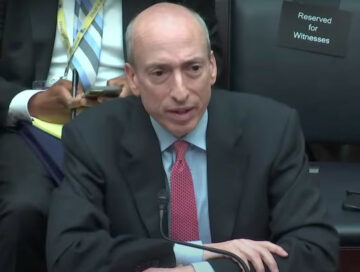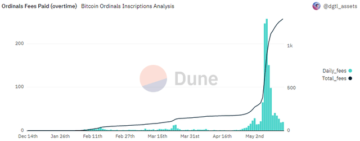
The European Union is in the process of building a blockchain infrastructure. This government-run blockchain aims to enhance public services throughout the bloc and combat fraud fueled by artificial intelligence. Nine EU countries are ready to establish a new political entity to oversee the implementation of the blockchain.
According to a recent study, counterfeit goods have cost European clothing, cosmetics, and toy industries €16 billion from 2018 to 2021. Counterfeiting remains a significant issue, particularly in Europe, where luxury brands like LVMH, Hermès, L’Oreal, and Dior are among the top 10 companies in terms of market capitalization in the region.
The rise of artificial intelligence has further aggravated the problem of counterfeiting. AI tools that are cheap and efficient can create fake authentic documents, which are then used in various registration processes remotely.
Joao Rodrigues Frade, who heads the Building Block and Innovative Service in the European Commission’s Directorate General for Digital Services, emphasized the need for effective tools to verify products, certificates, and documents to combat counterfeiting activities.
Frade, along with others, is working on the development of a European Union-wide blockchain. The goal is to digitalize and record public services for citizens and businesses on an EU-operated blockchain by 2030.
The European Blockchain Infrastructure (EBSI) has been in pilot mode since 2018, with various projects being carried out. The project is funded by the European Commission and is set to bring about a significant change in how public services are managed.
Nine EU countries, including Belgium, Italy, and Portugal, have agreed to establish a political body to implement the EBSI. The European Commission has allocated €347 million for blockchain-related research and innovation projects from 2017 to 2022.
The node operators for EBSI are trusted entities like universities or internet service providers who operate via a proof-of-authority consensus mechanism. The EU blockchain aims to be interoperable with other institution-run blockchains worldwide.
#worsening #16bn #tsunami #fake #goods #blockchain
- SEO Powered Content & PR Distribution. Get Amplified Today.
- PlatoData.Network Vertical Generative Ai. Empower Yourself. Access Here.
- PlatoAiStream. Web3 Intelligence. Knowledge Amplified. Access Here.
- PlatoESG. Carbon, CleanTech, Energy, Environment, Solar, Waste Management. Access Here.
- PlatoHealth. Biotech and Clinical Trials Intelligence. Access Here.
- Source: https://cryptoinfonet.com/regulation/the-eu-looks-to-blockchain-to-help-combat-a-e16bn-wave-of-counterfeit-goods-exacerbated-by-ai/
- :has
- :is
- :where
- 10
- 2017
- 2018
- 2021
- 2022
- 2030
- a
- About
- activities
- agreed
- AI
- aims
- allocated
- along
- among
- an
- and
- ARE
- artificial
- artificial intelligence
- Authentic
- BE
- been
- being
- Belgium
- Billion
- bloc
- Block
- blockchain
- Blockchain-related
- blockchains
- body
- brands
- bring
- Building
- businesses
- by
- CAN
- capitalization
- carried
- certificates
- change
- cheap
- Citizens
- Clothing
- combat
- commission
- Companies
- Consensus
- consensus mechanism
- continue
- Cost
- Counterfeit
- counterfeiting
- countries
- create
- CryptoInfonet
- Development
- digital
- digital services
- dior
- documents
- Effective
- efficient
- emphasized
- enhance
- entities
- entity
- establish
- EU
- Europe
- European
- european commission
- european union
- fake
- For
- fraud
- from
- fueled
- funded
- further
- General
- goal
- goods
- Have
- heads
- help
- How
- HTTPS
- implement
- implementation
- in
- Including
- industries
- Infrastructure
- Innovation
- innovative
- Intelligence
- Internet
- interoperable
- issue
- Italy
- jpg
- like
- LINK
- LOOKS
- Luxury
- lvmh
- managed
- Market
- Market Capitalization
- mechanism
- million
- Mode
- Navigation
- Need
- New
- nine
- node
- Node Operators
- of
- on
- operate
- operators
- or
- Other
- Others
- out
- oversee
- particularly
- pilot
- plato
- Plato Data Intelligence
- PlatoData
- political
- Portugal
- Problem
- process
- processes
- Products
- project
- projects
- providers
- public
- Reading
- ready
- recent
- record
- region
- Registration
- remains
- remotely
- research
- research and innovation
- Rise
- service
- service providers
- Services
- set
- significant
- since
- Study
- terms
- that
- The
- then
- this
- throughout
- to
- tools
- top
- Top 10
- toy
- trusted
- union
- Universities
- used
- various
- verify
- via
- Wave
- which
- WHO
- with
- working
- worldwide
- zephyrnet












